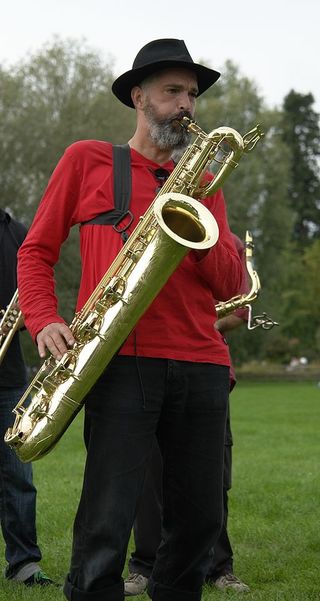Creativity
Depth or Breadth?
To specialize or not to specialize? That is the question.
Posted September 9, 2019

It is said that amateurs practice until they get it right, but professionals practice until they cannot get it wrong. On the surface, it’s hard to argue with this adage. As a music teacher, I’m sure I’ve told students that they shouldn’t move on to a new—and perhaps more appealing—project until they’ve completed the one they’re currently working on (that their teacher assigned to them!).
It seems that many in the musical world believe in mastery learning: take on one task at a time and complete it before moving on to the next more challenging one. Paramount in this approach is eliminating mistakes and otherwise getting it right. Focus is crucial. Certainly this approach lends itself well to many music settings, but it may not always be the best for optimal musical growth.
The underlying issue is specialization, which is assumed by many in music education to be part of the best path to music performance expertise. After all, one who tries to be a “jack of all trades” is likely to remain a “master of none,” right? A look at instrumental music education in American schools shows that specialization is a well-accepted principle. It is typical to limit young musicians' study to a single instrument (e.g., an instrument needed in the school orchestra or concert band), a single style of music (e.g., classical or classical-like music), and a single way of making music (e.g., practicing and rehearsing published works from printed notation). Anymore,such limitations are carried out based on tradition and institutional practice, rather than any deliberate consideration of learners’ traits, musical interests, or educational needs.
An emerging body of research, however, suggests that the accepted value of specialization deserves to be challenged. Journalist David Epstein summarizes the research in his 2019 book Range: Why Generalists Triumph in a Specialized World (Epstein, 2019). The author specifically challenges the 10,000 hours rule, which says that to reach elite level expertise, performers must cumulate ten thousand hours of deliberate practice, usually spread across about 10 years. The 10,000 hours rule has been applied to multiple domains—including music, sports, and chess--and has grown in popularity over the last decade since the publication of best-sellers Outliers by Malcolm Gladwell (2008) and Talent is Overrated by Geoff Colvin (2008).
In Range, Epstein uses two famous athletes as exemplars of elite-level performers. While he acknowledges that golfer Tiger Woods’ path to greatness included specialization as a young child and much deliberate practice, he also points to tennis great Roger Federer who played a large array of sports as a youngster and often shunned the structured practice of his tennis skills.
In explaining how Tiger and Roger achieved elite athletic performance through very different developmental processes, Epstein points to psychological research that has examined the kinds of skills needed in different domains. In some domains, success is facilitated through quick recognition of patterns for instant decision-making; in these domains—for example, chess and the sport of golf—performance feedback is clear and immediate, and expertise is built by refining technique through repetitive practice. Psychologists have categorized such domains as “kind” learning environments. Through much repetition, pattern recognition can become instantaneous and component motor skills highly automatized.
Other domains, however, are more “wicked” learning environments. Epstein argues that in domains that value creativity, high achievers are best served by a breadth of interests rather than specialization. He points to Nobel laureates, who he claims are much more likely to have engaged in a wide variety of creative endeavors, as compared to their less achieving counterparts. Epstein quotes Nobel laureate Santiago Ramon y Cajal who said of experts’ broad interests, “it appears they are scattering and dissipating their energies, while in reality they are channeling and strengthening them” (Root-Bernstein et al., 2008, p. 57)
Is music a “kind” or “wicked” learning domain? This question is not so easily answered. The world of music is so diverse that it is comprised of many sub-domains. Some pursuits within music performance are kind, inasmuch as success is aided by repetitive practicing toward the refinement of reliable performance technique. However other musical pursuits depend on creativity and impromptu actions.
It can be challenging to assign the labels of “kind” and “wicked” to learning environments within music. The genre of popular music is often described as formulaic and limited (especially in terms of the number of chords one must know to start a rock band). And for their part, aspiring classical musicians are expected to master scales, arpeggios, and other patterns so that they can deftly perform them when they’re encountered in the repertoire. Even though some aspects of music performance are clearly aided by limitation and repetitive practice, there are still reasons to incorporate breadth in musicians’ learning experiences.
In Range, Epstein considers music specifically and tells the story of a group of 17th- and 18th-century musicians in Europe whose early musical development was marked by experiences with multiple musical instruments. This musical range, or “early sampling period” as he calls it, led to these musicians developing a powerful musicianship and the ability to musically pick up anything very quickly. They were in great demand by composers at the time and they became known as the greatest musicians in the world.
It is certainly possible that a broad array of musical experiences can produce in young people traits that will later allow them to grow at a more rapid pace. It is also likely that many youngsters are more motivated by variety in their learning activities. Though these ideas have surely been overshadowed by the prevailing “wisdom” of early specialization, they are not particularly new. Eminent music psychologist John Sloboda is cited in Range for a 1991 study he and a colleague completed, in which they interviewed teenaged students at a special school for the musically gifted (Sloboda & Howe, 1991).
Their data suggested that “large amounts of early practice on a single instrument are only possible under particularly rigid and constrained regimes that may undermine the playful exploration many claim to be an essential aspect of musicianship” (p. 20). They also concluded that “the most able students had not devoted more time to practice than the others, but their practice time was more evenly distributed between a number of instruments” (p. 3).
Overly specialized music experiences may not only stunt the rate of musical growth, but they can also limit the kinds of musicianship acquired by developing musicians. Those of us who want young musicians to develop creativity and self-expression should pay particular heed to warnings about too much specialization too early. Whereas emphasis on performance precision demands the repetitive practice that produces polished technique, the development of creativity and self-expression requires that young musicians work through challenging conceptual problems. Solving conceptual problems is more time consuming than using well-practiced performance procedures (technique), but it allows learners to make important connections for themselves.
This type of musical learning can seem “messy” because it can be difficult to know when a student has mastered it; that is to say, feedback is not so clear and immediate as when, say, a musician is learning to perform all the correct notes at the proper tempo. But what it lacks in neatness, it makes up for in power. This messy learning can produce a broad understanding required for artistic creativity and genuine self-expression; it is learning that can be readily applied to a range of future musical settings. In Range, David Epstein summarizes educational research with the warning that a desire to more quickly arrive at a correct answer can change a “making connections” problem into a more simplistic rule-based “using procedures” problem.
I would add that past research in music education has indicated that repertoire-focused practicing and rehearsal does not reliably produce generalizable learning that students take with them when they move on to new music. Little transfer of learning occurs from piece to piece unless music teachers explicitly teach generalizable concepts and involve students in problem-solving while preparing repertoire for performance (Price & Byo, 2002; Lehmann, Sloboda, & Woody, 2007, ch. 10).
There probably are many settings and sub-genres within music in which specialization best serves developing musicians. It is equally likely, however, that there are other situations in which musicians are best served by gaining a breadth of experience. At the very least, aspiring musicians and music teachers should see breadth and specialization as two legitimate options to be considered for their own musical growth and that of their students.
Copyright 2019 Robert H. Woody
References
Colvin, G. (2008). Talent is overrated: What really separates world- class performers from everybody else. New York: Portfolio.
Epstein, D. (2019).Range: Why generalists triumph in a specialized world. New York: Riverhead.
Gladwell, M. (2008). Outliers: The story of success. New York: Little, Brown and Company.
Lehmann, A. C., Sloboda, J. A., & Woody, R. H. (2007). Psychology for musicians: Understanding and acquiring the skills. New York: Oxford University Press.
Price, H. E., & Byo, J. L. (2002). Rehearsing and conducting. In R. Parncutt & G. E. McPherson (Eds.), The science and psychology of music performance: Creative strategies for teaching and learning (pp. 335–351). New York: Oxford University Press.
Root-Bernstein, R. et al. (2008). Arts foster scientific success: Avocations of Nobel, National Academy, Royal Society, and Sigma Xi members. Journal of Psychology of Science and Technology, 1(2), 51-63.
Sloboda, J. A., & Howe, M. J. A. (1991). Biographical precursors of musical excellence: An interview study. Psychology of Music, 19, 3-21.




